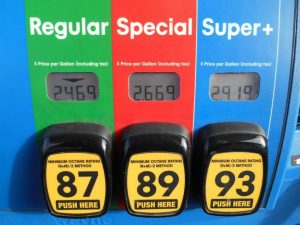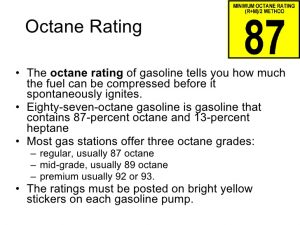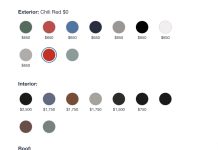Here’s the latest reader question, along with my reply!
Kenneth asks: What gas stations would you recommend that would be best for cars? What are some gas stations would you recommend avoiding? Are Costco gas and even Chevron (“with Techron”) gas are as good as people tend to perceive them to be? I used to just go to the local gas station, but I’m thinking about being a bit more selective to take better care of my car, which apparently requires premium gas. Thanks for your help!
My reply: The two most important things are – buying the right grade (octane) gas for your car and buying the gas from a station that is busy. Octane is a measure of a fuel’s resistance to heat and pressure – and premature (uncontrolled) ignition within the engine’s cylinders. Higher-octane fuel is more resistant heat/pressure – as in high-compression/turbo-supercharged engines. It is formulated to not burn until the spark triggers the burn. Use of lower-than-required octane in a high-compression/turbo-supercharged engine can result in premature (uncontrolled) ignition, with the force of the explosion trying to force the piston down when it is trying to come up (compression stroke), causing extreme mechanical stress on the entire reciprocating assembly. The driver may hear a “pinging” sound – which is really a kind of death rattle.
Luckily, all modern cars (those made since the late ’80s) have knock sensors and can adjust parameters such as ignition/cam timing and turbo boost to compensate, by lowering cylinder pressure. This reduces or eliminates mechanical stress and possible engine damage but you will notice the engine doesn’t perform as well; power will be down – and so will gas mileage. Hence, using lower-cost, lower-octane regular in an engine designed to burn more expensive premium will likely not save you any money – and will cost you performance.
Using higher-than-needed octane in an engine that was designed for regular won’t increase mileage or performance, either. In fact, you may see less of both – because (again) the fuel is mismatched to the engine.
So, try to use the right octane for your engine. Follow the manufacturer’s recommendations, which you can usually find in the owner’s manual or on a sticker on the inside of the fuel door/gas cap.
Additive packages are tricker. A given brand’s “premium” – usually also high octane – will usually have the top-shelf additive package. But that doesn’t mean the regular (low octane) and mid-grade gas does not – although it may. Due diligence is required here; check into the brands you are thinking about and find out whether all their grades have the same additive packages – or not.
Some brands do tout different additive packages – e.g., Techroline – but it’s a matter of trial and error testing to see which brand you car likes best. I recommend trying a tank of Brand A – and then Brand B. Compare the mileage you got on each tank as well as whether you noticed any difference in the way the car (engine) performed/felt.
The other big thing is to avoid gas stations – regardless of brand – that don’t get a lot of traffic. You don’t want to pump old gas into your tank. And possibly, water and other contaminants along with it. Getting fresh gas is especially important given the high ethanol concentration of most “gas” sold today – which is generally at least 10 percent ethanol.
Try to buy gas from a very busy station along a major thoroughfare. The odds are good this station gets its tanks refilled frequently – so you’ll be filling your tank with fresh gas!
. . .
Got a question about cars, Libertarian politics – or anything else? Click on the “ask Eric” link and send ’em in!
If you like what you’ve found here please consider supporting EPautos.
We depend on you to keep the wheels turning!
Our donate button is here.
If you prefer not to use PayPal, our mailing address is:
EPautos
721 Hummingbird Lane SE
Copper Hill, VA 24079
PS: Get an EPautos magnet or sticker or coaster in return for a $20 or more one-time donation or a $10 or more monthly recurring donation. (Please be sure to tell us you want a sticker – and also, provide an address, so we know where to mail the thing!)
My latest eBook is also available for your favorite price – free! Click here. If that fails, email me at EPeters952@yahoo.com and I will send you a copy directly!










I live in SW Missouri and can get ethanol-free gas, but only in “premium,” usually 91 octane. Not sure how much it matters but that’s what I use in my one gas-powered vehicle, my lawnmower, and all my power tools.
After working in the underground storage tank industry for years the thing that bothers me the most (in terms of where I buy fuel) are the operators that cut corners to save money in the short term. Things like having the old steel tanks lined (the liners seldom hold up well), ignoring small leaks in the product piping, etc..
Your state (Dept. of Natural Resources) likely maintains a public database of inspection violations, might be worth your time to have a look.
Techron is a decent fuel system cleaner and I have used it to clean injectors before (on the bench).
The ‘best’ premium gas I’ve found was Shell v power, which is higher in toluene content. You could also add the toluene yourself…
My 2001 supercharged 3.8L buick consistently showed the best mpg running shell v power and the least knock counts. Never drag raced it without using premium fuel.
My ’95 LT1 Roadmaster would tolerate 6 degrees more timing before logging knock counts on v power vs. generic 87 octane. MPG and 1/4 mile numbers were unaffected by higher octane/more timing so I tuned it back to run generic 87 gas again.
more info:
https://www.bimmerfest.com/forums/showthread.php?t=411398
https://www.speed-talk.com/forum/viewtopic.php?f=1&t=54544&sid=e5a15dcacca582cc7d427af9547edfd3
Gasoline is gasoline. And motor oil is motor oil. Cheapest is best
Us that like a car is a car and the cheapest is better? I always figure mileage and after a while I’ll see a variation between brands. Like DBB, I used Shell gasoline for many years since I got better mileage with it.